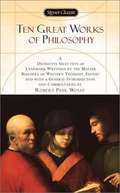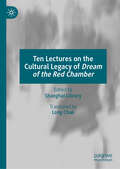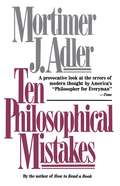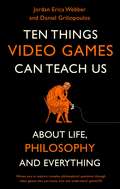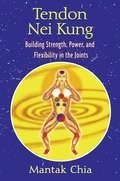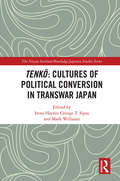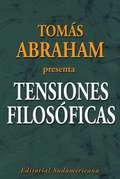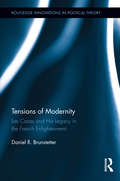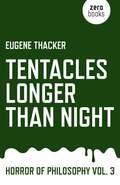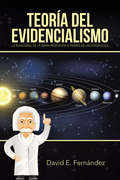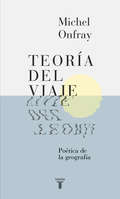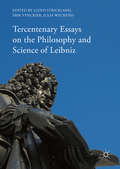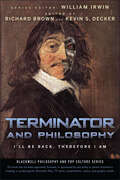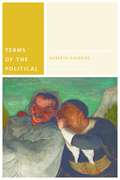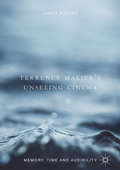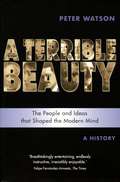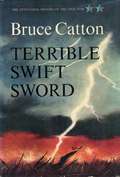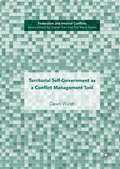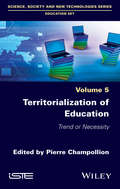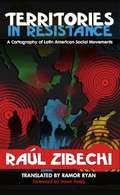- Table View
- List View
Ten Great Works Of Philosophy
by Robert Paul WolffIn its vast scope, this book presents the continuum of Western philosophy. Ranging from ancient Greece to nineteenth-century America, it traces the history of our civilization through the seminal works of its most influential thinkers. Each philosopher in this volume made intellectual history; each created a revolution in ideas; each reaffirmed man's view of himself as a sentient being capable of creating order out of the baffling contradictions of existence. And the most powerful reflections and speculations of each are represented here. Plato: Apology, Crito and the Death of Socrates, from Phado Aristotle: Poetics St. Ansem: The ontological Proof of St. Ansem, from Proslogium St. Thomas Aquinas: St. Thomas' Proofs of God's Existence, from the SummaTheologica René Descartes: Meditations on the First Philosophy David Hume: An Inquiry Concerning Human Understanding Immanuel Kant: Prolegomena to Any Future Metaphysics John Stuart Mill: Utilitarianism William James: The Will to Believe
Ten Lectures on the Cultural Legacy of Dream of the Red Chamber
by Shanghai LibraryThis book offers a profound exploration of the classic Chinese novel Dream of the Red Chamber, recognized as a masterpiece of traditional Chinese literature. Developed from a series of lectures at the Shanghai Library, the text features insights from ten prominent scholars, including Wang Meng and Bai Xianyong, addressing themes such as poetic aesthetics, tragic beauty, female perspectives, and cultural symbolism. The chapters delve into multifaceted interpretations, connecting literature with cultural, philosophical, and artistic heritage. Designed for both specialists and general readers, this book enriches understanding of one of the world’s literary treasures, blending cultural appreciation with critical scholarship. It highlights the novel’s timeless narrative, intricate character portrayals, social critique, and artistic sophistication, offering a gateway to understanding Chinese culture’s enduring legacy and its global significance. Readers will discover rich analyses, compelling arguments, and fresh perspectives that deepen their appreciation for this unparalleled literary classic.
Ten Philosophical Mistakes
by Mortimer J. AdlerAn illuminating critique of modern thought from America's "Philosopher for Everyman" (Time).Ten Philosophical Mistakes examines ten errors in modern thought and shows how they have led to serious consequences in our everyday lives. It teaches how they came about, how to avoid them, and how to counter their negative effects.
Ten Things Video Games Can Teach Us: (about life, philosophy and everything)
by Jordan Erica Webber Daniel GriliopoulosWOULD YOU KILL ONE PERSON TO SAVE FIVE OTHERS?If you could upload all of your memories into a machine, would that machine be you? Is it possible we're all already artificial intelligences, living inside a simulation?These sound like questions from a philosophy class, but in fact they're from modern, popular video games. Philosophical discussion often uses thought experiments to consider ideas that we can't test in real life, and media like books, films, and games can make these thought experiments far more accessible to a non-academic audience. Thanks to their interactive nature, video games can be especially effective ways to explore these ideas.Each chapter of this book introduces a philosophical topic through discussion of relevant video games, with interviews with game creators and expert philosophers. In ten chapters, this book demonstrates how video games can help us to consider the following questions:1. Why do video games make for good thought experiments? (From the ethical dilemmas of the Mass Effect series to 'philosophy games'.)2. What can we actually know? (From why Phoenix Wright is right for the wrong reasons to whether No Man's Sky is a lie.)3. Is virtual reality a kind of reality? (On whether VR headsets like the Oculus Rift, PlayStation VR, and HTC Vive deal in mass-market hallucination.)4. What constitutes a mind? (From the souls of Beyond: Two Souls to the synths of Fallout 4.)5. What can you lose before you're no longer yourself? (Identity crises in the likes of The Swapper and BioShock Infinite.)6. Does it mean anything to say we have choice? (Determinism and free will in Bioshock, Portal 2 and Deus Ex.)7. What does it mean to be a good or dutiful person? (Virtue ethics in the Ultima series and duty ethics in Planescape: Torment.)8. Is there anything better in life than to be happy? (Utilitarianism in Bioshock 2 and Harvest Moon.)10. How should we be governed, for whom and by who? (Government and rights in Eve Online, Crusader Kings, Democracy 3 and Fable 3.)11. Is it ever right to take another life? And how do we cope with our own death? (The Harm Thesis and the good death in To The Moon and Lost Odyssey.)
Ten Things Video Games Can Teach Us: (about life, philosophy and everything)
by Jordan Erica Webber Daniel GriliopoulosWOULD YOU KILL ONE PERSON TO SAVE FIVE OTHERS?If you could upload all of your memories into a machine, would that machine be you? Is it possible we're all already artificial intelligences, living inside a simulation?These sound like questions from a philosophy class, but in fact they're from modern, popular video games. Philosophical discussion often uses thought experiments to consider ideas that we can't test in real life, and media like books, films, and games can make these thought experiments far more accessible to a non-academic audience. Thanks to their interactive nature, video games can be especially effective ways to explore these ideas.Each chapter of this book introduces a philosophical topic through discussion of relevant video games, with interviews with game creators and expert philosophers. In ten chapters, this book demonstrates how video games can help us to consider the following questions:1. Why do video games make for good thought experiments? (From the ethical dilemmas of the Mass Effect series to 'philosophy games'.)2. What can we actually know? (From why Phoenix Wright is right for the wrong reasons to whether No Man's Sky is a lie.)3. Is virtual reality a kind of reality? (On whether VR headsets like the Oculus Rift, PlayStation VR, and HTC Vive deal in mass-market hallucination.)4. What constitutes a mind? (From the souls of Beyond: Two Souls to the synths of Fallout 4.)5. What can you lose before you're no longer yourself? (Identity crises in the likes of The Swapper and BioShock Infinite.)6. Does it mean anything to say we have choice? (Determinism and free will in Bioshock, Portal 2 and Deus Ex.)7. What does it mean to be a good or dutiful person? (Virtue ethics in the Ultima series and duty ethics in Planescape: Torment.)8. Is there anything better in life than to be happy? (Utilitarianism in Bioshock 2 and Harvest Moon.)10. How should we be governed, for whom and by who? (Government and rights in Eve Online, Crusader Kings, Democracy 3 and Fable 3.)11. Is it ever right to take another life? And how do we cope with our own death? (The Harm Thesis and the good death in To The Moon and Lost Odyssey.)
Tendon Nei Kung: Building Strength, Power, and Flexibility in the Joints
by Mantak ChiaA guide to strengthening and repairing the tendons to reverse the effects of aging • Shows how strengthening the tendons can lead to more energy, healthier organs, and prevention of arthritis • Explains how to practice the postures alone or with a partner • Includes the Mung Beans hitting practice, which repairs damaged tendons and joints; relieves constipation, stomach cramps, and headaches; and aids in detoxification Healthy tendons are the foundation of true strength in the body. Strong and supple tendons and open joints allow more space to store raw energy, which can then be transformed into higher creative and spiritual energy. The eight postures of Tendon Nei Kung are specifically designed to open the joints and fortify and grow all the tendons in the body, strengthening them as a unit. Like the practice of Iron Shirt Chi Kung, Tendon Nei Kung cultivates the ability to move the earth force up from the ground, through the feet, and into the body, in this case raising it to nourish the tendons. In Tendon Nei Kung, Mantak Chia explains how to perform the eight postures individually as well as with a partner. He reveals how regular practice of Tendon Nei Kung can help prevent and relieve arthritis by forcing poisoning acid out of the body to make room for healing chi energy. He provides ten supplementary exercises to help heal damaged tendons and joints without strenuous movement and also includes information on the Mung Beans hitting practice, an ancient practice that in addition to repairing damaged tendons and joints also aids in detoxification and relieves constipation, stomach cramps, and headaches.
Tenkō: Cultures Of Political Conversion In Transwar Japan (Nissan Institute/Routledge Japanese Studies)
by Irena Hayter; George T. Sipos; Mark WilliamsThis book approaches the concept of tenkō (political conversion) as a response to the global crisis of interwar modernity, as opposed to a distinctly Japanese experience in postwar debates. Tenkō connotes the expressions of ideological conversion performed by members of the Japanese Communist Party, starting in 1933, whereby they renounced Marxism and expressed support for Japan’s imperial expansion on the continent. Although tenkō has a significant presence in Japan’s postwar intellectual and literary histories, this contributed volume is one of the first in Englishm language scholarship to approach the phenomenon. International perspectives from both established and early career scholars show tenkō as inseparable from the global politics of empire, deeply marked by an age of mechanical reproduction, mediatization and the manipulation of language. Chapters draw on a wide range of interdisciplinary methodologies, from political theory and intellectual history to literary studies. In this way, tenkō is explored through new conceptual and analytical frameworks, including questions of gender and the role of affect in politics, implications that render the phenomenon distinctly relevant to the contemporary moment. Tenkō: Cultures of Political Conversion in Transwar Japan will prove a valuable resource to students and scholars of Japanese and East Asian history, literature and politics.
Tensiones filosóficas
by Tomás AbrahamLos binomios, las parejas que los distintos ensayistas de este libro han elegido proceden de distintos escenarios y saberes: el arte, la filosofía, la historia. Se piensa contra alguien. Las ideas no sobrevuelan un espacio de libertad. Una nueva idea, una palabra lanzada al mundo, debe atravesar un muro. Es el muro del pensar de otro. En este libro se muestra el modo en que otro sella, marca y tensa las intenciones creadoras. Por eso presentamos una serie de múltiples combates. Tensiones filosóficas captura la inquietud y la vibración de dos fuerzas (no siempre solidarias, no siempre opuestas) en la aventura del pensar. Los binomios, las parejas que los distintos ensayistas de este libro han elegido proceden de distintos escenarios y saberes -el arte, la filosofía, la historia- y constituyen un elenco, Armando Discepolo, Bernini, Mahler, Goddard, Freud, Osho- que encuentran otro convocado -García Lorca, Quiroga, Derrida, enrique Santos Discepolo, Borromini, Schoenberg, Truffaut, Rank, Heidegger- una respuesta acorde o contradictoria, una resonancia oportuna o un silencio indescifrable pero doloroso, un eco lejano e inmediato. Excepto el caso extremo, Pessoa, ya que el poeta portugués, sabía que su escasez o su demasía de ser, en la contienda de la pluralidad, reclamaba a otro idéntico y distinto, un heterónimo.
Tensions of Modernity: Las Casas and His Legacy in the French Enlightenment (Routledge Innovations in Political Theory)
by Daniel R. BrunstetterPolitics today is marked by tension between claims of universal human rights and diversity. From the war on terror to immigration, one of the major challenges facing liberalism is to understand the scope of equality in a world in which certain peoples are perceived to reject and/or violently resist democratic principles. This book revisits Europe’s initial encounter with the Native Americans of the New World to shed light on how the West’s initial defense of so-called ‘barbarians’ has influenced the way we think about diversity today, and elucidate the arguments of exclusion that unconsciously permeate the moral world we live in. In doing so, Daniel R. Brunstetter traces Bartolomé de Las Casas’s oft heralded defense of the Native Americans in the sixteenth century through the French Enlightenment. While this defense has been rightly lauded as an early example of human rights discourse, tracing Las Casas’s arguments into the eighteenth century shows how his view of equality enabled arguments legitimizing the annihilation by ‘just’ war of those perceived to be ‘barbarians’. This philosophical narrative can be useful when thinking about concepts such as just war, multiculturalism, and immigration, or any area in which politics confronts radical difference.
Tentacles Longer Than Night: Horror of Philosophy
by Eugene ThackerOur contemporary horror stories are written in a world where there seems little faith, lost hope, and no salvation. All that remains is the fragmentary and occasionally lyrical testimony of the human being struggling to confront its lack of reason for being in the vast cosmos. This is the terrain of the horror genre.Eugene Thacker explores this situation in Tentacles Longer Than Night. Extending the ideas presented in his book In The Dust of This Planet, Thacker considers the relationship between philosophy and the horror genre. But instead of taking fiction as the mere illustration of ideas, Thacker reads horror stories as if they themselves were works of philosophy, driven by a speculative urge to question human knowledge and the human-centric view of the world, ultimately leading to the limit of the human—thought undermining itself, in thought. Tentacles Longer Than Night is the third volume of the "Horror of Philosophy" trilogy, together with the first volume, In The Dust of This Planet, and the second volume, Starry Speculative Corpse.
Teoría de todo, de Jed McKenna--La perspectiva iluminada
by Jed Mckenna Maria-Teresa ZentenoLos libros de Jed McKenna son lectura obligada para cualquier persona que no tenga miedo de ir donde la investigación honesta le conduzca, y nadie que sea serio acerca de su espiritualidad puede permitirse no leerlos. El lema de Wisefool Press es "La búsqueda ha terminado". Hay buenas razones para decir eso. Algunos lectores se han referido a los últimos libros de Jed como "los últimos libros espirituales que una persona necesitará leer", y también hay buenas razones para ello. La conclusión es que la espiritualidad tiene una cuestión fundamental que responder y Jed nos muestra dónde se encuentra.
Teoría del evidencialismo: La búsqueda de la gran respuesta a través de las evidencias
by David E. Fernández¿Venimos de un Diseño o una aleatoriedad? ¿Te atreves a buscar la respuesta? ¿Qué tiene que ver la constante cosmológica con los Ooparts? ¿Qué relación tiene el principio antrópico con la filosofía? ¿Qué tiene que decir la ciencia a la gran pregunta? ¿Hay un diseñador inteligente? ¿Venimos todos de una gran casualidad, invadidos por la indeterminación o la aleatoriedad? ¿Importa conocer la respuesta acaso? <P><P>En este libro se presentan muchas evidencias para que el mismo lector sea capaz de llegar a su propia conclusión. Esta obra es un viaje a los grandes conceptos que tanto la filosofía como la ciencia no han podido, o querido, indagar por sí mismos. Descúbrelo tú mismo. <P><P>Bienvenido al viaje de las evidencias. Un ensayo que te obligará a replantearte la propia existencia humana. Una obra maestra que llegará al lector como una guía necesaria. No cabe duda, lo que todos necesitamos. Carlos Reyes, autor de La señal de Judas.
Teoría del viaje
by Michel OnfrayUna guía para quienes quieran sentirse viajeros, y no turistas. Por Michel Onfray, autor de best-sellers comoTratado de ateología o Antimanual de filosofía. «Todo viaje es iniciático.» Michel Onfray convierte el viajar, uno de los sencillos placeres de la vida, en un estimulante tema de reflexión. Además de ser una invitación a soltar amarras, este libro tiene el poder de prolongar la emoción y el sabor del viaje a través de la filosofía y la literatura, de la historia y la mitología. Deseo de partir, preparativos sumidos en lecturas, elección del medio, entusiasmo y sorpresa a la llegada, despertar de los cinco sentidos durante la estancia, toma de notas y fotografías, regreso a casa, elaboración del recuerdo..., todas las etapas cobran en este libro una dimensión filosófica. Teoría del viaje es una declaración de guerra a nuestra tendencia a cuadricular y cronometrar nuestra existencia, y una brillante hoja de ruta para quienes quieran sentirse viajeros y no turistas. Reseña:«Onfray convierte el placer de viajar en un interesante tema de reflexión.»Gabi Martínez, Cultura/s, La Vanguardia «El profesor francés Michel Onfray ha escrito Teoría del viaje. Poética de la geografía, un manifiesto a favor del desajuste de todos los sentidos que supone "el deseo ferviente de la movilidad".»El Viajero de El País «El libro, este libro, constituye, todo él, una invitación no solo a la realización del viaje -cualquier viaje, ya sea en sentido real-físico, ya lo sea en sentido espiritual-,y tal tarea es algo que se presenta algo así como necesario complemento vital, como necesidad de manifestarse, de ser. En ese sentido otro aforismo vendría a ratificar lo expuesto, a sabiendas: "siempre se camina hacia el final, el que no existe".»Ricardo Martínez, Todo Literatura
Tercentenary Essays on the Philosophy and Science of Leibniz
by Lloyd Strickland Erik Vynckier Julia WeckendThis book presents new research into key areas of the work of German philosopher and mathematician Gottfried Wilhelm Leibniz (1646-1716). Reflecting various aspects of Leibniz's thought, this book offers a collection of original research arranged into four separate themes: Science, Metaphysics, Epistemology, and Religion and Theology. With in-depth articles by experts such as Maria Rosa Antognazza, Nicholas Jolley, Agustín Echavarría, Richard Arthur and Paul Lodge, this book is an invaluable resource not only for readers just beginning to discover Leibniz, but also for scholars long familiar with his philosophy and eager to gain new perspectives on his work.
Teresa, My Love: An Imagined Life of the Saint of Avila (To The Point)
by Julia KristevaMixing fiction, history, psychoanalysis, and personal fantasy, Teresa, My Love turns a past world into a modern marvel, following Sylvia Leclercq, a French psychoanalyst, academic, and incurable insomniac, as she falls for the sixteenth-century Saint Teresa of Avila and becomes consumed with charting her life. Traveling to Spain, Leclercq, Julia Kristeva's probing alter ego, visits the sites and embodiments of the famous mystic and awakens to her own desire for faith, connection, and rebellion. One of Kristeva's most passionate and transporting works, Teresa, My Love interchanges biography, autobiography, analysis, dramatic dialogue, musical scores, and images of paintings and sculpture to engage the reader in Leclercq's—and Kristeva's—journey. Born in 1515, Teresa of Avila outwitted the Spanish Inquisition and was a key reformer of the Carmelite Order. Her experience of ecstasy, which she intimately described in her writings, released her from her body and led to a complete realization of her consciousness, a state Kristeva explores in relation to present-day political failures, religious fundamentalism, and cultural malaise. Incorporating notes from her own psychoanalytic practice, as well as literary and philosophical references, Kristeva builds a fascinating dual diagnosis of contemporary society and the individual psyche while sharing unprecedented insights into her own character.
Terminator and Philosophy
by William Brown Irwin Richard Decker Kevin S.A timely book that uses science fiction to provoke reflection and discussion on philosophical issues From the nature of mind to the ethics of AI and neural enhancement, science fiction thought experiments fire the philosophical imagination, encouraging us to think outside of the box about classic philosophical problems and even to envision new ones. Science Fiction and Philosophy explores puzzles about virtual reality, transhumanism, whether time travel is possible, the nature of artificial intelligence, and topics in neuroethics, among other timely issues. This thought-provoking volume is suitable for students and general readers but also examines new and more advanced topics of interest to seasoned philosophers and scientists. Susan Schneider (Hometown TK) is Assistant Professor in the department of philosophy at the University of Pennsylvania and an Affiliated Faculty Member at the Institutes for Research in Cognitive Science and Center for Cognitive Neuroscience.
Terms of the Political: Community, Immunity, Biopolitics
by Roberto Esposito Rhiannon Noel WelchTerms of the Political: Community, Immunity, Biopolitics presents a decade of thought about the origins and possibilities of political theory from one of contemporary Italy's most prolific and engaging political theorists, Roberto Esposito. He has coined a number of critical concepts in current debates about the past, present, and future of biopolitics--from his work on the implications of the etymological and philosophical kinship of community (communitas) and immunity (immunitas) to his theorizations of the impolitical and the impersonal. Taking on interlocutors from throughout the Western philosophical tradition, from Aristotle and Augustine to Weil, Arendt, Nancy, Foucault, and Agamben, Esposito announces the eclipse of a modern political lexicon--"freedom," "democracy," "sovereignty," and "law"--that, in its attempt to protect human life, has so often produced its opposite (violence, melancholy, and death). Terms of the Political calls for the opening of political thought toward a resignification of these and other operative terms--such as "community," "immunity," "biopolitics," and "the impersonal"--in ways that affirm rather than negate life. An invaluable introduction to the breadth and rigor of Esposito's thought, the book will also welcome readers already familiar with Esposito's characteristic skill in overturning and breaking open the language of politics.
Terrence Malick and the Examined Life (Intellectual History of the Modern Age)
by Martin WoessnerTerrence Malick is one of American cinema’s most celebrated filmmakers. His films—from Badlands (1973) and Days of Heaven (1978) to The Thin Red Line (1998), The Tree of Life (2011), and, most recently, A Hidden Life (2019)—have been heralded for their artistry and lauded for their beauty, but what really sets them apart is their ideas. Terrence Malick and the Examined Life is the most comprehensive account to date of this unparalleled filmmaker’s intellectual and artistic development.Utilizing newly available archival sources to offer original interpretations of his canonical films, Martin Woessner illuminates Malick’s early education in philosophy at Harvard and Oxford as well as his cinematic apprenticeship at the American Film Institute to show how a young student searching for personal meaning became a famous director of Hollywood films. Woessner’s book presents a rich, interdisciplinary exploration of the many texts, thinkers, and traditions that made this transformation possible—from the novels of Hamlin Garland, James Jones, and Walker Percy to the philosophies of Stanley Cavell, Martin Heidegger, and Søren Kierkegaard to road movies, Hollywood Westerns, and the comedies of Jean Renoir. Situating Malick’s filmmaking within recent intellectual and cultural history, Woessner highlights its lasting contributions to both American cinema and the life of the mind.Terrence Malick and the Examined Life suggests it is time for philosophy to be viewed not merely as an academic subject, overseen by experts, but also as a way of life, open to each and every moviegoer.
Terrence Malick’s Unseeing Cinema: Memory, Time And Audibility
by James BatchoThis unique study opens up a new dimension of Terrence Malick’s cinema – its expressions of unseeing and hearing. ‘Unseeing’ is Malick’s means of transcending the moment in order to enter the life that unfolds; to treat cinema as a real experience for those who live its reality. In this way, Terrence Malick’s Unseeing Cinema moves beyond film theory to advance a work of original philosophy, bringing together two thinkers not normally associated with one another: Gilles Deleuze and Søren Kierkegaard. It investigates how Malick’s gatherings of time allow one to explore new philosophical questions about immanence and transcendence, ethics and faith, time and infinity, and the foldings of subjectivity that are central to both philosophers. Beyond cinema, it offers a way to think about our everyday repetitions and recollections and our ephemeral points of connection with those we love.
Terrible Beauty: The People and Ideas that Shaped the Modern Mind: A History
by Peter WatsonA history of the twentieth century which covers all the ideas, people, great events, literary and artistic movements, scientific discoveries which have shaped the twentieth century.Terrible Beauty presents a unique narrative of the twentieth century. Unlike more conventional histories, where the focus is on political events and personalities, on wars, treaties and elections, this book concentrates on the ideas that made the century so rich, rewarding and provocative. Beginning with four seminal ideas which were introduced in 1900 - the unconscious, the gene, the quantum and Picasso's first paintings in Paris - the book brings together the main areas of thought and juxtaposes the most original and influential ideas of our time in an immensely readable narrative. From the creation of plastic to Norman Mailer, from the discovery of the 'Big Bang' to the Counterculture, from Relativity to Susan Sontag, from Proust to Salman Rushdie, and Henri Bergson to Saul Bellow, the book's range is encyclopedic. We meet in these pages the other twentieth century, the writers, the artists, the scientists and philosophers who were not cowed by the political and military disasters raging around them, and produced some of the most amazing and rewarding ideas by which we live. Terrible Beauty, endlessly stimulating and provocative, affirms that there was much more to the twentieth century than war and genocide.
Terrible Beauty: The People and Ideas that Shaped the Modern Mind: A History
by Peter WatsonA history of the twentieth century which covers all the ideas, people, great events, literary and artistic movements, scientific discoveries which have shaped the twentieth century.Terrible Beauty presents a unique narrative of the twentieth century. Unlike more conventional histories, where the focus is on political events and personalities, on wars, treaties and elections, this book concentrates on the ideas that made the century so rich, rewarding and provocative. Beginning with four seminal ideas which were introduced in 1900 - the unconscious, the gene, the quantum and Picasso's first paintings in Paris - the book brings together the main areas of thought and juxtaposes the most original and influential ideas of our time in an immensely readable narrative. From the creation of plastic to Norman Mailer, from the discovery of the 'Big Bang' to the Counterculture, from Relativity to Susan Sontag, from Proust to Salman Rushdie, and Henri Bergson to Saul Bellow, the book's range is encyclopedic. We meet in these pages the other twentieth century, the writers, the artists, the scientists and philosophers who were not cowed by the political and military disasters raging around them, and produced some of the most amazing and rewarding ideas by which we live. Terrible Beauty, endlessly stimulating and provocative, affirms that there was much more to the twentieth century than war and genocide.
Terrible Swift Sword (American Civil War Trilogy #2)
by Bruce CattonThe second episode in this award-winning trilogy impressively shows how the Union and Confederacy, slowly and inexorably, reconciled themselves to an all-out war—an epic struggle for freedom. In Terrible Swift Sword, Bruce Catton tells the story of the Civil War as never before—of two turning points which changed the scope and meaning of the war. First, he describes how the war slowly but steadily got out of control. This would not be the neat, short, “limited” war both sides had envisioned. And then the author reveals how the sweeping force of all-out conflict changed the war’s purpose, in turning it into a war for human freedom. It was not initially a war against slavery. Instead, this was, Mr. Lincoln kept insisting, a fight to reunite the United States. At first, it was not even much of a fight. Cautious generals; inexperienced, incompetent, or jealous administrators; shortages of good people and supplies; excess of both gloom and optimism, kept each side from swinging into decisive action. As the buildup began, there were maddening delays. The earliest engagements were halting and inconclusive. After these first tests at arms, reputations began to crumble. Buell, Halleck, Beauregard Albert Sidney Johnston. Failed to drive ahead—for reasons good and bad. General McClellan (impaled in these pages on the arrogant words of his letters) captured more imaginations than enemies, and continued to accept serious over estimates of Confederate strength while becoming more and more fatally estranged from his own government.
Territorial Self-Government as a Conflict Management Tool (Federalism and Internal Conflicts Ser.)
by Dawn WalshThis book provides an in-depth narrative of the difficulties facing Territorial Self-Government institutions across Northern Ireland, Bosnia, the former Yugoslav Republic of Macedonia, Moldova, and Iraq. It brings together analyses of both prominent and lesser known cases to provide a broad overview of how Territorial Self-Government operates as a conflict management tool in different contexts. Drawing on lessons from these five cases, the author demonstrates the importance of designing and implementing international guarantees to self-government and the associated difficulties. Domestic capacity development must be encouraged and international actors needs to balance the guarantees aimed at providing stability with their wider security and economic concerns. The volume also strongly connects to broader research and theory on conflict management, particularly the role of institutional design and international assistance.
Territorialization of Education: Trend or Necessity
by Pierre ChampollionThis comprehensive scientific work embraces, within the generic theme of "educations, territorialities and territories", the vast majority of different facets of the complex relationships between educations and territories that have developed over time. It sheds an original light on the many - and, for some, new - interactions between territories-territories, on the one hand, and educations, on the other hand, which have recently been identified and analyzed. Beyond this main objective, it contributes to improving the fine and differentiated understanding of the concept of territory in the sciences of education and training and, more importantly, it brings innovative developments to the still embryonic theorization of the complex relations between educations. and territories-territorialities. This book shows, in particular, through its surveys, its analyzes and its results, that within all the multiple influences attributed to the different dimensions of the territories, the very discrete territoriality - falling within the symbolic territory - is perhaps finally the the most important territorial vector in terms of education in certain areas (rural Montagnards, for example), particularly as regards educational and vocational guidance, but not only. Lastly, it is not uninteresting to note that the theme it bears is spreading more and more today beyond scientific circles: the problem of inequalities in education and orientation of territorial origin is fueling - recently - the controversies and the reflections of the French educational policy which is thus sometimes echoed - in declarative terms essentially for the moment! - scientific advances in this area
Territories in Resistance
by Raul Zibechi Ramor Ryan"Rich and complicated . . . [Territories in Resistance] will be a key reference point in the development of anti-systemic thought."--Gilberto López y Rivas, La Jornada Territories in Resistance is an indispensable complement to existing literature on Latin American autonomous social movements. Explore the "other worlds" being created in the wreckage of colonialism and capitalism. From Mexico, Ecuador, and Colombia to Argentina and Brazil, no living author digs as deep and presents theoretical challenges quite like Raúl Zibechi. Raúl Zibechi is an international analyst for Brecha, a weekly journal in Montevideo, Uruguay, and the author of Dispersing Power: Social Movements as Anti-State Forces (AK Press, 2010).
